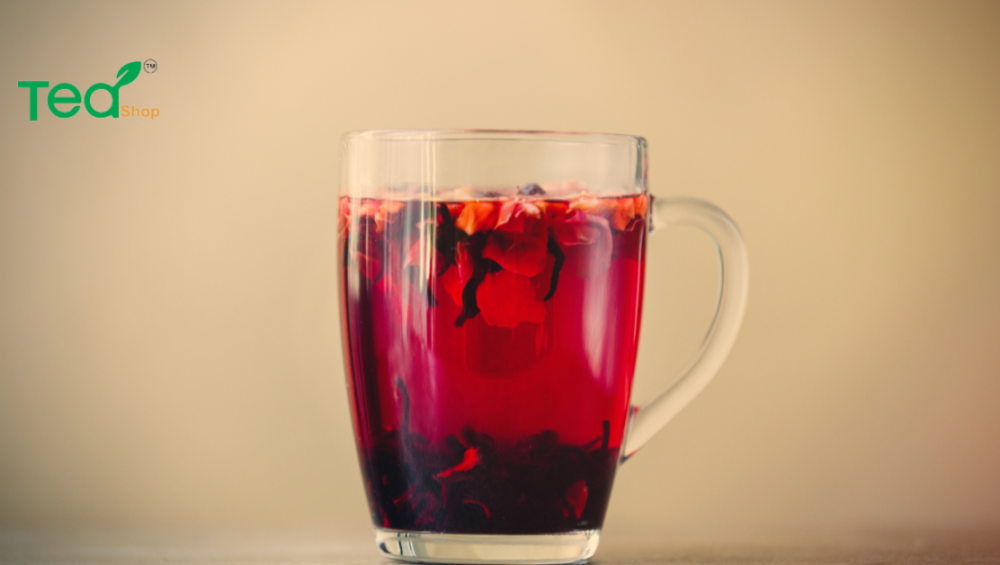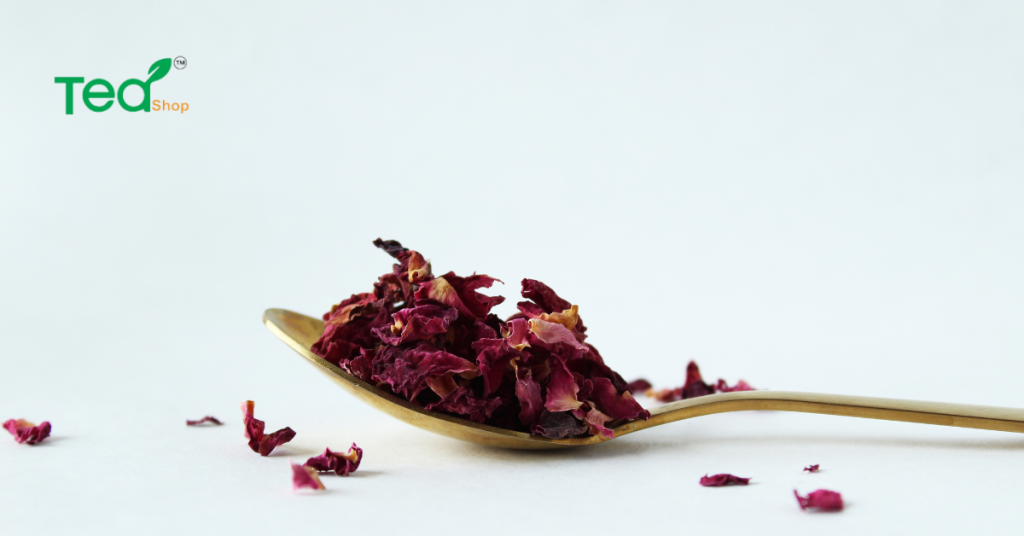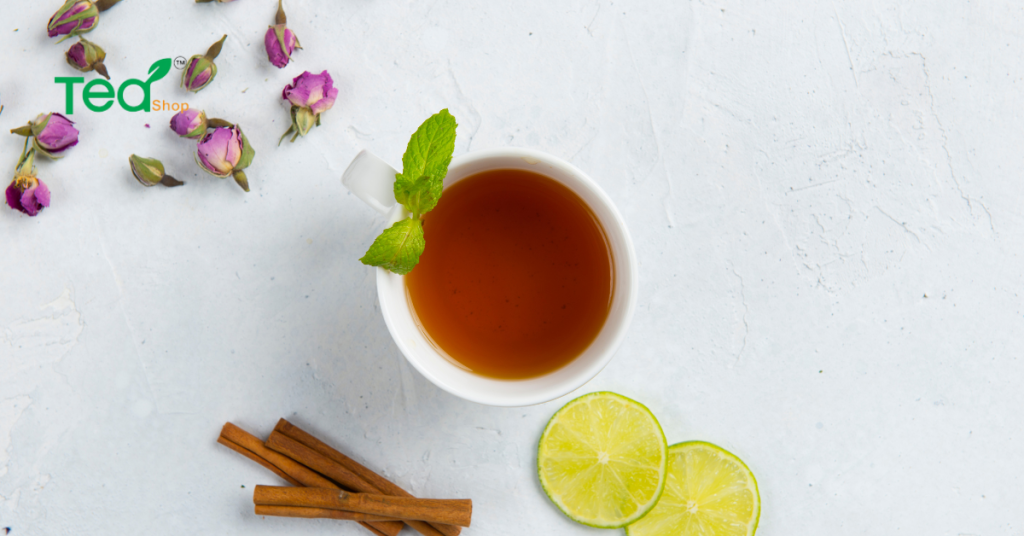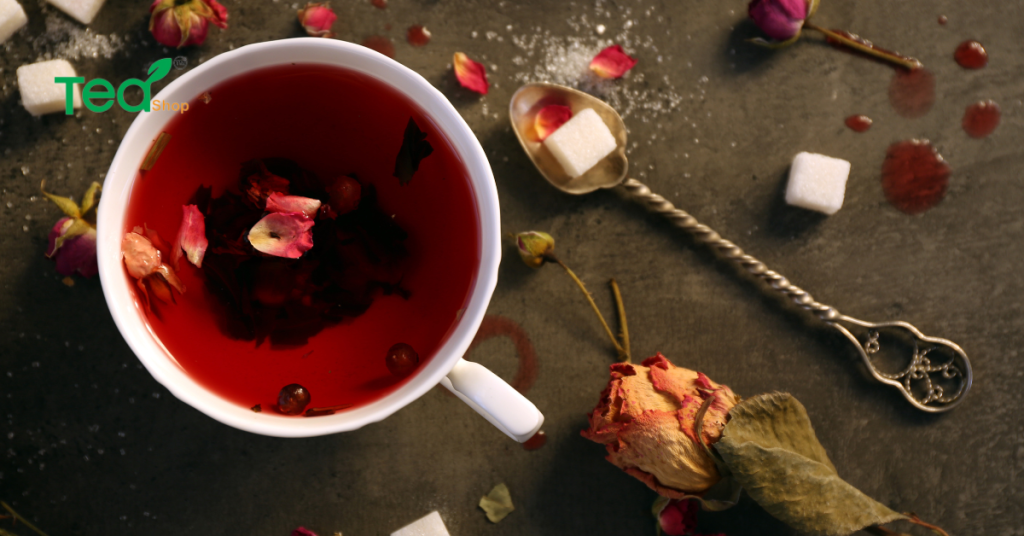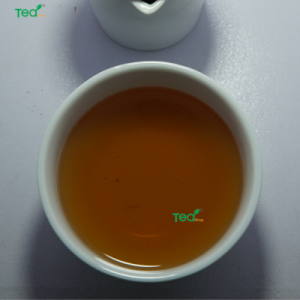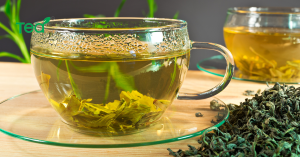Rose tea is a type of herbal tea that is made from the petals of the Rosa damascena plant, also known as the Damask rose. The petals are dried and then brewed to create a fragrant and flavorful tea that is enjoyed for its delicate taste and delicate aroma. Rose tea is considered to be a soothing and calming beverage and is often consumed to help relieve stress and anxiety. It can also be used to help with digestion and other health concerns. In some cultures, rose tea is also believed to have beauty and skin benefits due to its high levels of antioxidants.
Rose Tea Overview
Rose tea is a type of herbal tea made from the petals of the Rosa damascena plant, which is commonly known as the Damask rose. This tea is known for its delicate and fragrant aroma, as well as its subtle and slightly sweet taste.
Rose tea is typically brewed by steeping dried rose petals in hot water for several minutes. The color of the tea is a light yellow or orange hue, and the aroma is strongly floral and reminiscent of fresh roses.
In addition to its pleasing taste and scent, rose tea is also believed to offer a number of health benefits. Some people drink rose tea to help soothe stress and anxiety, while others use it to support digestive health. Rose tea is also high in antioxidants, which are compounds that help protect the body from damage from free radicals, and may have anti-inflammatory properties.
In some cultures, rose tea is also used as a traditional remedy for various ailments, such as menstrual cramps and headaches. Additionally, it is believed to have skin benefits due to its high levels of antioxidants and is often used in beauty and skincare products for this reason.
Overall, rose tea is a flavorful and aromatic tea that is enjoyed for its delicate taste, fragrance, and potential health benefits.
Rose Tea Definition
Rose tea is a type of herbal tea made from the dried petals of the Rosa damascena plant, also known as the Damask rose. It is a flavorful and fragrant tea that is characterized by its delicate and slightly sweet taste, as well as its light yellow or orange color and strong floral aroma.
The process of making rose tea involves steeping dried rose petals in hot water for several minutes to extract their flavor and aroma. The resulting tea is often enjoyed for its relaxing and calming effects, as well as its potential health benefits.
Rose tea is believed to have a number of health benefits, including reducing stress and anxiety, improving digestion, and helping to protect the body from damage from free radicals due to its high levels of antioxidants. Additionally, it is also sometimes used as a traditional remedy for various ailments in some cultures and is believed to have skin benefits due to its high antioxidant content.
Types Of Rose Tea
There are several different types of rose tea, each with its own unique flavor, aroma, and health benefits. Some of the most common types of rose tea include:
- Damask Rose Petal Tea: This is the traditional type of rose tea made from the dried petals of the Rosa damascena plant. It is considered to be the most fragrant and flavorful type of rose tea, and is known for its delicate taste and calming effects.
- Rosehip Tea: This type of rose tea is made from the dried hips of the rose plant, rather than the petals. It is typically a more robust and fruity tea, with a slightly tart flavor. Rosehip tea is a good source of vitamin C and other antioxidants and is often used to help boost the immune system.
- Rose Bud Tea: This type of rose tea is made from the dried buds of the rose plant, and is known for its delicate flavor and sweet aroma. It is a mild and soothing tea that is often enjoyed for its relaxing effects.
- Rose and Green Tea Blend: This type of rose tea is made by combining green tea with dried rose petals. The result is a tea that has the antioxidant benefits of green tea, as well as the delicate flavor and aroma of roses.
- Rose and Black Tea Blend: This type of rose tea is made by blending black tea with dried rose petals. It has a stronger and bolder flavor than traditional rose tea, and is a good choice for those who prefer a more robust tea.
These are some of the most common types of rose tea, but there are many other variations and blends available that incorporate different types of tea and herbs with rose petals. The type of rose tea that you choose will depend on your personal taste preferences and the health benefits that you are looking for.
Rose tea has a number of potential health benefits, including:
- Antioxidant Properties: Rose tea is high in antioxidants, which can help protect cells from damage caused by free radicals and reduce the risk of certain diseases.
- Anti-inflammatory Effects: Rose tea has anti-inflammatory properties, which can help reduce inflammation in the body and alleviate symptoms of conditions such as arthritis and irritable bowel syndrome (IBS).
- Improved Digestion: Rose tea can help improve digestion by reducing bloating and relieving symptoms of indigestion and constipation.
- Relieves Stress and Anxiety: Rose tea has a calming effect that can help relieve stress and anxiety. The fragrance of roses is also believed to have a relaxing effect on the mind and body.
- Boosts Immune System: Rose tea contains vitamin C, which is essential for a strong immune system. Drinking rose tea can help boost the immune system and prevent illness.
It’s important to note that more research is needed to fully understand the health benefits of rose tea and that drinking too much can cause side effects like stomach upset or an allergic reaction.
Rose Tea in Bangladesh
Rose tea is a popular beverage in Bangladesh, where it is commonly consumed for its flavor and potential health benefits. The tea is made from dried rose petals, which are steeped in boiling water to extract their flavor and beneficial compounds.
In Bangladesh, rose tea is often consumed in social settings and is considered a treat or a luxury. It is commonly served in restaurants, at special occasions like weddings, and in homes during special events like Eid or other festivals.
In addition to its cultural significance, rose tea is also popular in Bangladesh for its potential health benefits, such as reducing stress and anxiety and improving digestion. People in Bangladesh often drink rose tea to relieve various symptoms and promote overall well-being.
Overall, rose tea is an important part of the culture and health practices in Bangladesh, and its popularity is likely to continue in the years to come.
Rose Tea For Weight Loss
Rose tea is not a magic solution for weight loss, and there is no scientific evidence to support the idea that drinking rose tea alone can cause significant weight loss. However, including rose tea as part of a balanced diet and exercise program may have some benefits for weight management.
Here’s why:
- Low calorie: Rose tea is naturally low in calories, so it can be a good alternative to high-calorie drinks like soda or sweetened coffee.
- Antioxidant properties: Antioxidants can help boost metabolism and support weight loss.
- Calming effect: Drinking rose tea can help reduce stress and anxiety, which can be triggers for overeating and weight gain.
It’s important to keep in mind that in order to see any significant weight loss results, it is important to adopt a healthy diet and exercise regularly. Drinking rose tea can be a helpful addition to a weight loss plan, but it should not be relied upon as the sole solution.
Rose Tea Side Effects
While rose tea is generally considered safe for most people, it can cause some side effects in some individuals. Some common side effects of rose tea include:
- Allergic Reactions: Some people may experience an allergic reaction to the roses in rose tea. Symptoms of an allergic reaction may include skin rash, itching, swelling, and difficulty breathing.
- Stomach Upset: Drinking large amounts of rose tea can cause stomach upset, such as nausea, bloating, and diarrhea.
- Interactions with Medications: Rose tea may interact with certain medications, including sedatives, blood pressure medications, and antidepressants.
- Hormonal Imbalance: Rose tea contains compounds that can affect hormones in the body, so it may not be suitable for women who are pregnant, breastfeeding, or undergoing hormonal therapy.
- Excessive Intake: Consuming large amounts of rose tea can lead to an overdose of the beneficial compounds found in roses, which can cause side effects such as dizziness, headache, and upset stomach.
It’s important to consult with a healthcare professional before drinking rose tea, especially if you have a medical condition or are taking any medications. They can help determine if rose tea is safe for you and advise you on the appropriate amount to consume.
Rose Tea Caffeine
Rose tea contains very little, if any, caffeine. Caffeine is a natural stimulant that is found in some teas and coffee and is known to cause increased energy, alertness, and concentration.
Because rose tea is made from dried rose petals, which do not contain caffeine, it is considered a caffeine-free beverage. This makes it a good alternative for those who are sensitive to caffeine or who wish to avoid it for other reasons.
It’s important to keep in mind that while rose tea is caffeine-free, some rose tea blends may contain small amounts of tea leaves, which do contain caffeine. It’s best to check the ingredient list of the specific rose tea product you are using to determine its caffeine content.
Rose Tea Price In Bangladesh
The price of rose tea in Bangladesh can vary depending on several factors, such as the brand, quality, and availability of the product. On average, a pack of 20-25 tea bags of rose tea can cost between 100 to 250 Bangladeshi Taka (BDT). And ready blended tea 1000 taka to 40000 taka.
Some high-end brands of rose tea may be more expensive, while more basic or generic brands may be less expensive. The price can also vary based on the store or location where the tea is purchased.
In Bangladesh, rose tea is readily available in grocery stores, supermarkets, and online. It can also be found in specialty tea shops and tea stalls, where the price may be slightly higher due to the added convenience and specialized service.
Overall, the price of rose tea in Bangladesh is relatively affordable, making it accessible to a wide range of consumers.
Rose Tea Shop In Bangladesh
There are several shops in Bangladesh where you can purchase rose tea. Some popular places to find rose tea in Bangladesh include:
- Grocery Stores: Most grocery stores and supermarkets in Bangladesh carry a selection of rose tea brands, making it easy to find and purchase.
- Specialty Tea Shops: There are several specialty tea shops in Bangladesh that specialize in selling high-quality teas, including rose tea. These shops offer a wide range of rose tea blends and can provide expert advice and recommendations.
- Online Retailers: Online retailers in Bangladesh, such as Tea Shop Daraz and Grameen, offer a wide range of rose tea products that can be conveniently ordered and delivered to your doorstep.
- Local Markets: Local markets in Bangladesh, such as the New Market in Dhaka, offer a wide range of products, including rose tea, at affordable prices.
Regardless of where you purchase your rose tea, it’s important to choose a reputable brand and to read the ingredients and packaging carefully to ensure that you are getting a high-quality product.


